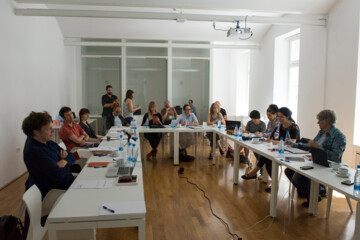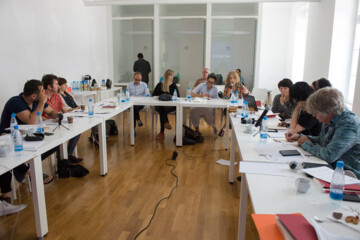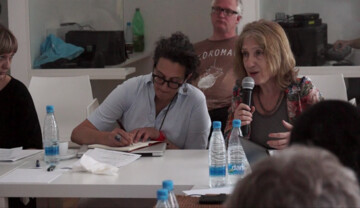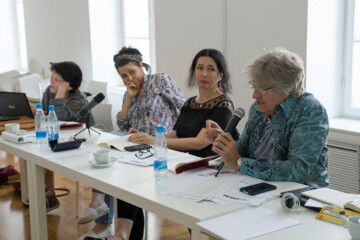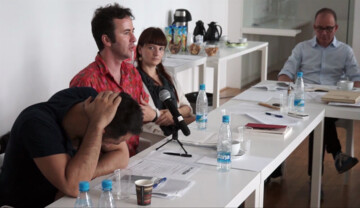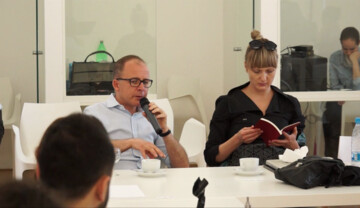| summary |
In the last decade, we have stuck to the notion of the commons as the only exit from the cul de sac of capitalism and the fates of austerity and scarcity reserved for those excluded from the increasingly narrow circles of accumulation. For the “commons” to be more than a mere discursive illusion, different forms of disrupting the cycle of expropriation and of producing commonwealth must be shared and disseminated.
The commons are manifested in various ways that encourage, celebrate and protect the right to diversity. They are signified by a decentralised structure, which moves away from “traditional” methods of making artistic statements, protests, or social critiques in the globalised world. The artistic groups working with the idea of the commons look more like an elaborate → network. In part, this web-like structure is the result of internet-based organising, but it is also a response to political realities that sparked the idea of the commons in the first place.
As our communal spaces (squares, parks, streets, and schools) are increasingly occupied by the global marketplace, a spirit of radical reclaiming of the commons and resistance toward a noncritical representation of the world as a global village is taking place. Artists are disrupting, remodelling, repurposing, and hacking networking tools in order to attack the existing apparatuses provided by various corporate regimes. Their critiques propose more transparent modes of socio-political conduct, with active and conscious use of technology to unveil the current liberal views of the free market and culture as structures which trap culture within capitalist relations.
Curated by Zdenka Badovinac and Bojana Piškur (MG+MSUM, Ljubljana, Slovenia).
Participating narrators: Nick Aikens (Vanabbe, Eindhoven, NL), Burak Arıkan (SALT, Istanbul, TR), Zdenka Badovinac (MG+MSUM, Ljubljana, SI), Sezgin Boynik (XK/FIN), Carlos Prieto del Campo (NMCARS, Madrid, ES), Róza El-Hassan (Budapest, HU), Aigul Hakimova (Ljubljana, SI), Vít Havránek (Prague, CZ), Ida Hiršenfelder (MG+MSUM, Ljubljana, SI), Anders Kreuger (M HKA, Antwerpen, BE), Miglena Nikolchina (Sofia, BG), Bojana Piškur (MG+MSUM, Ljubljana, SI), pantxo ramas (IT/ES), Rasha Salti (Beirut, LBN), Jelena Vesić (Belgrade, SR).
|
| venue |
Museum of Contemporary Art Metelkova (+MSUM), Maistrova 3, Ljubljana, Slovenia |
| date | 27 to 29 June 2016 |
| title | Glossary as Commons: Glitches in the Network |
| lecturer | Miglena Nikolchina |
| venue | Museum of Contemporary Art Metelkova (+MSUM), Maistrova 3, Ljubljana, Slovenia, Seminar Room |
| date | 27 June 2016, at 6 p.m. |
Antonio Negri’s conceptualisation of the commons as an “artificial” formation that “resides in languages, images, knowledges, affects, codes, habits, and practices” opens a novel perspective on a number of relatable notions, which have emerged throughout history: agora, republic of letters, world literature, heterotopia, etc. Neither private, nor public, the commons, like language, needs sharing in order to produce, create, and grow. And yet, we know that some languages are more common than others. With reference to Boris Buden’s observations on failed translation, this talk will expand his question “what went wrong” to glossary as a critical aspect of the commons.
Miglena Nikolchina is a writer, literary historian and theoretician whose research engages the interactions of literature, philosophy, political studies, and feminist theory. She is a professor at the Department of Theory of Literature at the University of Sofia, Bulgaria. Her writing has been motivated by a lasting interest in the (para)human as process and transformation, and the artificial being as an artistic and philosophical challenge. It is in this context that she investigated, historically but also in terms of structural impasses, the discursive attainments and failures of two grand projects from the second half of the 20th century: the feminist and the East European “velvet” revolutions. In English, her publications include the books Matricide in Language: Writing Theory in Kristeva and Woolf (2004) and Lost Unicorns of the Velvet Revolutions: Heterotopias of the Seminar (2013); and, among her more recent articles, “Inverted Forms and Heterotopian Homonymy: Althusser, Mamardashvili, and the Problem of ‘Man’.” boundary 2, 2014.
